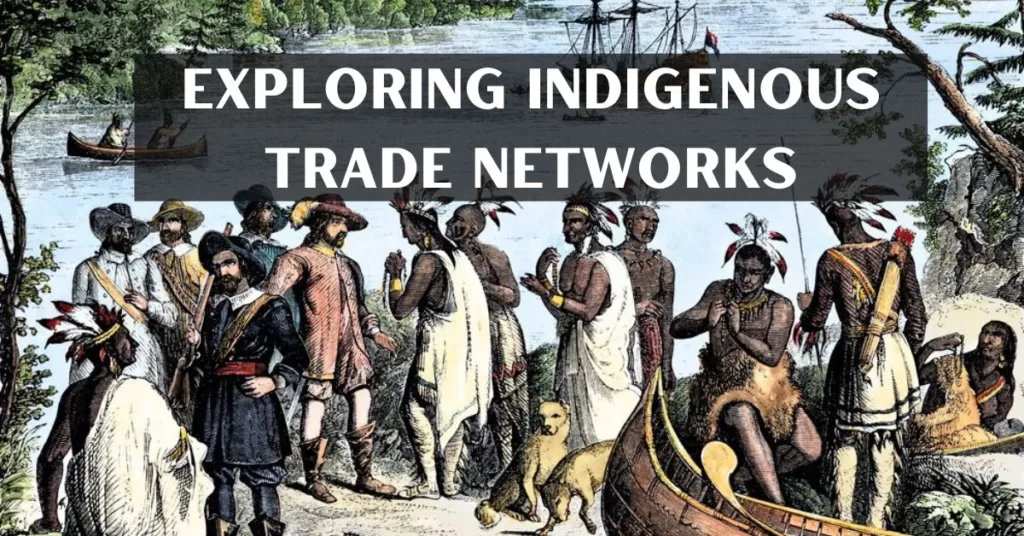Indigenous trade networks have played a crucial role in shaping the economic, social, and cultural landscape of pre-colonial societies. In this article, we will explore the origins of these networks, their impact on commerce, and their role in fostering cultural exchange and sustainability. We’ll also discuss the lasting influence of Indigenous trade practices on today’s world and the valuable lessons they offer for contemporary societies grappling with the challenges of globalization, climate change, and inequality. Join us as we delve into the rich history and ongoing significance of Indigenous trade networks.
Table of Contents
The Origins of Indigenous Trade Networks
The origins of Indigenous trade networks can be traced back thousands of years, revealing a complex web of regional cooperation and exchange that has shaped the development of diverse cultures and societies. These intricate systems, founded on traditional knowledge and respect for the environment, have stood the test of time, proving the resilience and sustainability of Indigenous trade practices.
Long before the arrival of European colonizers, Indigenous communities across the globe were actively engaged in trade with their neighbors. From the vast networks of North American tribes to the interconnected island communities in the Pacific, Indigenous peoples demonstrated remarkable resourcefulness and adaptability in their trading endeavors.
These pre-colonial trade networks not only facilitated the exchange of goods and services, but also fostered cultural exchange and the sharing of valuable knowledge among different Indigenous groups. As we delve deeper into the origins of these Indigenous trade networks, we uncover a rich tapestry of cooperation, innovation, and sustainable practices that continue to influence the modern world.
Early trade routes and regional cooperation
The establishment of early trade routes among Indigenous communities played a crucial role in fostering regional cooperation and the development of robust economies. These routes, often spanning vast distances, enabled the exchange of essential resources, such as food, tools, and textiles, allowing communities to capitalize on their unique strengths and adapt to their respective environments.
For example, in the Americas, extensive trade networks connected tribes from the Arctic to the tip of South America. Similarly, Indigenous Australians forged trade routes across the continent, exchanging ochre, stone tools, and other valuable goods. In the Pacific, island communities like the Polynesians navigated the open ocean, connecting remote islands through their intricate seafaring skills.
Role of traditional knowledge in establishing trade systems
Traditional knowledge was instrumental in establishing these early trade systems, as Indigenous peoples relied on their intimate understanding of the land, waterways, and climate to navigate their surroundings and foster mutually beneficial relationships with neighboring communities.
Oral history, in particular, played a significant role in preserving and passing down generations of trade-related knowledge. Elders would share stories, songs, and other forms of cultural expression to teach younger generations about the significance of trade partnerships, the locations of key trading hubs, and the various protocols that needed to be observed during trade interactions.
By combining their in-depth knowledge of local resources, geography, and cultural practices, Indigenous peoples were able to create sophisticated trade networks that facilitated the exchange of goods and ideas across vast distances, paving the way for the flourishing of diverse cultures and communities.
Pre-Colonial Trade and the Barter System
The pre-colonial era witnessed the rise of complex Indigenous trade networks, which were built on the foundation of the barter system. This ancient method of exchanging goods and services was the backbone of commerce for Indigenous communities, enabling them to establish strong trade relationships and promote economic stability without the need for a centralized currency. As we explore the intricacies of pre-colonial trade and the barter system, we will gain a deeper understanding of the innovative and sustainable practices employed by Indigenous peoples in their pursuit of prosperity and cultural exchange.

Common goods and services exchanged
Indigenous trade networks facilitated the exchange of a wide variety of goods and services, depending on the unique resources and skills possessed by each community. Some common items exchanged in these pre-colonial trade networks included food, textiles, tools, and raw materials such as metals, stone, and wood. For example, coastal tribes might trade fish, shells, or pearls for products like animal hides, pottery, or crops from inland communities.
In addition to tangible goods, services such as craftsmanship, healing practices, and even entertainment were exchanged among Indigenous groups. This exchange of knowledge and skills further strengthened trade relationships and contributed to the overall well-being of participating communities.
Influence of cultural practices on trade
Cultural practices played a significant role in shaping Indigenous trade networks and influencing the types of goods and services exchanged. Each community had its own unique set of customs, beliefs, and values that governed trade interactions, ensuring that exchanges were conducted fairly, sustainably, and respectfully.
For instance, certain items held spiritual or ceremonial significance for specific tribes, and were only exchanged in particular contexts or with specific partners. Additionally, trade relationships were often established and maintained through rituals, ceremonies, and the observance of various protocols, such as gift-giving, feasting, or other forms of hospitality.
By respecting and adhering to these cultural practices, Indigenous peoples were able to create mutually beneficial trade partnerships that transcended mere economic transactions, fostering a deeper sense of connection, understanding, and cooperation among diverse communities.
Cultural Exchange Through Indigenous Trade Networks
Indigenous trade networks were not merely conduits for the exchange of goods and services; they also played a vital role in facilitating cultural exchange and fostering relationships among diverse Indigenous communities. These interactions led to the sharing of knowledge, traditions, and ideas, enriching the cultural landscape of various regions and laying the groundwork for future cooperation. In this section, we will examine the profound impact of Indigenous trade networks on cultural exchange, highlighting the importance of these connections in shaping the identity and development of Indigenous societies throughout history.
Intertribal relationships and knowledge sharing
Indigenous trade networks served as a catalyst for the development of intertribal relationships, fostering collaboration and trust among different Indigenous communities. As these relationships evolved, so too did the exchange of knowledge, wisdom, and cultural practices. This cross-cultural exchange was instrumental in the dissemination of vital information, such as agricultural techniques, medicinal practices, and even artistic and spiritual traditions.
Knowledge sharing through trade enabled Indigenous communities to adapt to new challenges and environments, ensuring their survival and growth over time. It also facilitated the diffusion of innovations and ideas, allowing for the development of new technologies and the refinement of existing practices. This continuous exchange of knowledge contributed to the resilience and dynamism of Indigenous cultures, showcasing their ability to learn from one another and adapt to changing circumstances.
Role of oral history in preserving trade practices
Oral history played a crucial role in preserving and perpetuating trade practices among Indigenous communities. As most Indigenous cultures did not rely on written records, information about trade routes, partners, and customs was passed down through generations using stories, songs, and other forms of oral tradition.
These narratives, rich with cultural and historical knowledge, were shared among community members and acted as a living repository of trade-related information. By memorizing and retelling these stories, Indigenous peoples were able to maintain their trade networks and practices even in the face of significant challenges, such as colonization and cultural disruption.
Furthermore, oral history served to reinforce the cultural significance of trade, emphasizing the values of cooperation, reciprocity, and respect that underpinned Indigenous trade networks. This ensured that future generations would continue to value and engage in trade relationships, preserving the knowledge and practices integral to the survival and prosperity of their communities.
Sustainability and Indigenous Trade Networks
Indigenous trade networks have long been characterized by their focus on sustainability and balance, with Indigenous communities employing practices that prioritize harmony with the environment and the well-being of future generations. This commitment to sustainability has played a critical role in the endurance and success of these networks, ensuring that resources remain available for continued trade and cultural exchange. In this section, we will delve into the principles and practices that have guided Indigenous peoples in their pursuit of sustainable trade, shedding light on the valuable lessons these networks can teach us about responsible resource management and ecological stewardship.
Traditional resource management practices
Indigenous communities have long employed traditional resource management practices to ensure the sustainability of their trade networks. These practices, honed over generations, allowed them to maintain a delicate balance between the needs of the present and the well-being of future generations.
For instance, Indigenous peoples would often use controlled burns to promote the growth of specific plants or improve the health of forests, ensuring the availability of essential resources for trade. Similarly, they practiced sustainable hunting and fishing methods, such as setting catch limits or observing seasonal restrictions, to prevent overexploitation and depletion of wildlife populations.
Environmental consciousness and respect for the land
A deep-seated environmental consciousness and respect for the land underpin the sustainability of Indigenous trade networks. Indigenous peoples view themselves as stewards of the environment, with a responsibility to protect and preserve the land and its resources for the benefit of future generations.
This reverence for nature is reflected in the way Indigenous communities approached trade, as they sought to minimize their ecological footprint and promote the health and well-being of the ecosystems upon which they depended. By adhering to traditional knowledge and customs, Indigenous peoples were able to establish trade networks that fostered both economic and ecological sustainability.
These time-tested practices serve as powerful reminders of the importance of responsible resource management and environmental stewardship, offering valuable lessons for modern societies grappling with the challenges of sustainable development and climate change.
Indigenous Trade Networks and Modern Implications
The historical importance of Indigenous trade networks cannot be overstated, but their relevance extends far beyond the past. As modern societies face a myriad of challenges, from globalization to climate change, the principles and practices embodied by Indigenous trade networks offer valuable insights and potential solutions. In this section, we will examine the modern implications of Indigenous trade networks, highlighting how their sustainable, cooperative, and culturally rich foundations can inform and inspire contemporary efforts to build more equitable, resilient, and inclusive societies.
Lessons from pre-colonial commerce for contemporary trade systems
Indigenous trade networks offer a wealth of lessons for contemporary trade systems, particularly in terms of sustainability, cooperation, and mutual benefit. By prioritizing the long-term well-being of both the environment and the communities involved, these networks have proven to be both resilient and adaptable in the face of changing circumstances.
Modern trade systems can benefit from embracing similar values, such as prioritizing environmental stewardship and ensuring that the benefits of trade are equitably distributed among participating communities. Additionally, embracing the spirit of reciprocity and collaboration found in Indigenous trade networks can foster more cooperative and fair international trade practices.
Potential for fostering regional cooperation and cultural understanding
Indigenous trade networks also demonstrate the potential for fostering regional cooperation and cultural understanding among diverse communities. By creating channels for the exchange of goods, knowledge, and ideas, these networks facilitated the development of strong intertribal relationships and fostered a sense of shared identity.
In today’s interconnected world, the principles embodied by Indigenous trade networks can serve as a blueprint for promoting regional cooperation and cultural understanding on a larger scale. By embracing the values of mutual respect, reciprocity, and shared benefit, contemporary societies can foster more inclusive, harmonious, and resilient relationships, both within and across national boundaries. This approach has the potential to reduce conflicts, promote cultural exchange, and contribute to the development of more equitable and sustainable global trade systems.
Conclusion
In conclusion, the study of Indigenous trade networks reveals a rich history of sustainable, cooperative, and culturally diverse commerce that has shaped the world we know today. These networks offer valuable insights into the principles and practices that can guide contemporary societies towards more equitable, resilient, and environmentally responsible trade systems. By understanding the lasting impact of pre-colonial commerce, we can draw inspiration from the wisdom and experiences of Indigenous peoples to build a brighter, more harmonious future for all.
FAQ: Indigenous Trade Networks: Pre-Colonial
What were the main purposes of Indigenous trade networks?
Indigenous trade networks facilitated the exchange of goods, services, and knowledge among various Indigenous communities. These networks helped to establish intertribal relationships, promote cultural understanding, and maintain sustainable resource management practices.
How did Indigenous communities ensure the sustainability of their trade networks?
Indigenous communities relied on traditional resource management practices, such as controlled burns, catch limits, and seasonal restrictions on hunting and fishing, to maintain a balance between the needs of the present and the well-being of future generations. They also held a deep respect for the environment and saw themselves as stewards responsible for protecting and preserving the land and its resources.
What types of goods and services were commonly exchanged within Indigenous trade networks?
Commonly exchanged goods and services included food items, clothing, tools, medicinal plants, and luxury items such as shells, feathers, and beads. The specific goods exchanged varied depending on the resources available to each community and their cultural practices.
How did Indigenous trade networks contribute to cultural exchange?
Indigenous trade networks fostered cultural exchange by facilitating the sharing of knowledge, ideas, and customs among diverse communities. This process allowed for the development of strong intertribal relationships, the spread of innovative technologies and practices, and the growth of shared cultural identities.
What lessons can contemporary societies learn from Indigenous trade networks?
Modern societies can learn valuable lessons from Indigenous trade networks, including the importance of sustainable resource management, cooperation, and cultural understanding. Embracing the principles and practices of these networks can help contemporary societies build more equitable, resilient, and inclusive trade systems.
How are Indigenous trade networks relevant to today’s world?
The principles and practices embodied by Indigenous trade networks offer insights and potential solutions for modern challenges such as globalization, climate change, and social inequality. By drawing on the experiences and wisdom of Indigenous peoples, contemporary societies can develop more sustainable, cooperative, and culturally rich approaches to trade and resource management.

Joyce Ann Tyldesley is a renowned British archaeologist, Egyptologist, writer, and broadcaster.






